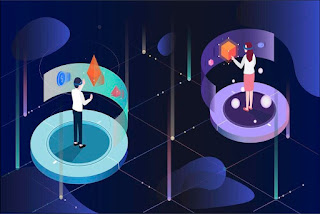Artificial intelligence (AI) and blockchain are two distinct technologies with different purposes and applications, but they do share some similarities.

· Disruptive technologies:
AI and blockchain is that they are both disruptive technologies that have the potential to transform
industries and create new opportunities. AI has the potential to revolutionize many industries by enabling automation, data analysis, and decision-making, while blockchain has the potential to transform industries by enabling more secure and transparent transactions and eliminating intermediaries.
· Complexity and Technical Expertise:
Both AI and blockchain
require specialized knowledge and expertise for their development,
implementation, and maintenance. They involve complex algorithms and concepts
that require skilled professionals.
|
Differences |
AI |
Blockchain |
|
Purpose and Function |
AI focuses on
creating intelligent systems that can perform tasks that typically require
human intelligence, such as natural language processing, image recognition,
and decision-making. |
Blockchain is
a decentralized and distributed ledger technology designed to securely record
and verify transactions across multiple parties without the need for
intermediaries. |
|
Data Handling |
AI heavily relies on large datasets to train algorithms and make
predictions. It analyzes and learns from data to improve performance. |
blockchain focuses on securely storing and verifying data in a
transparent and tamper-resistant manner. It does not typically involve data
analysis or machine learning. |
|
Centralization vs. Decentralization |
AI systems
are typically centralized, meaning that the processing and decision-making
happen on a central server or in the cloud. |
blockchain is
a decentralized technology where data and transactions are distributed across
a network of nodes, allowing for increased transparency, security, and
resilience. |
|
Applications and Use Cases |
AI finds applications in a wide range of areas, including
healthcare, finance, manufacturing, and customer service. It enables
automation, data analysis, and decision support. |
Blockchain, on the other hand, is commonly associated with
cryptocurrencies like Bitcoin, but its potential extends beyond finance. It
can be used for supply chain management, smart contracts, identity
verification, and more. |
|
Data Privacy and Security |
AI systems
often require access to large amounts of data, raising concerns about privacy
and security. |
Blockchain,
with its decentralized and immutable nature, provides enhanced security and
data integrity by using cryptographic techniques. It allows for transparent
yet secure transactions and ensures data integrity. |
|
Development and Implementation |
AI development typically involves designing and training models
using large datasets. It requires computational resources and expertise in
machine learning algorithms. |
Blockchain development involves creating decentralized networks,
establishing consensus mechanisms, and implementing smart contracts using
blockchain platforms. |
While
AI and blockchain are distinct technologies, there can be areas of convergence.
For example, AI techniques can be used to analyze blockchain data and extract
insights, and blockchain can provide a secure and transparent framework for
data sharing and validation in AI systems.
Overall, AI and blockchain have different goals, functions, and applications. Understanding their respective strengths and limitations is crucial for leveraging their potential in various industries and addressing the unique challenges they present.

Comments
Post a Comment
any suggestion on my side